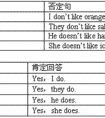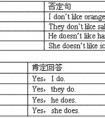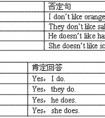根据要求改写句子。1. Nancy usually listens to music at the weekends.(对画线部分提问)________ ________ Nancy usually do at the weekends?2. How do you spend yo-五年级英语
题文
| 根据要求改写句子。 |
| 1. Nancy usually listens to music at the weekends.(对画线部分提问) ________ ________ Nancy usually do at the weekends? 2. How do you spend your weekends?(用she替换句中的you改写句子) How ________ she spend ________ weekends? 3. I study at Lianyi Primary School. (改为一般疑问句并作肯定回答) -________ you ________at ________Lianyi Primary School? -________, I ________. 4. What do you usually do at the weekends?(写出同义句) ________ do you ________ ________weekends? |
答案
| 1. What does 2. does, her 3. Do, study, Yes, do 4. How, spend your |
据专家权威分析,试题“根据要求改写句子。1. Nancy usually listens to music at the ..”主要考查你对 一般疑问句,疑问代词,副词,一般现在时,动词单数第三人称,实义动词,助动词 等考点的理解。关于这些考点的“档案”如下:
一般疑问句疑问代词副词一般现在时,动词单数第三人称实义动词助动词
考点名称:一般疑问句
- 一般疑问句:
是疑问句的一种。它是以be动词,have或助动词、情态动词开头,用yes(是)或no(否)来回答的句子。
其结构是:系动词be/助动词/情态动词+主语+其他成分
一般疑问句的肯定形式为:
助动词+主语(+实义动词)。肯定答语用“yes+可定结构”。
一般疑问句的否定形式为:
助动词构成的缩写否定词+主语(+实义动词)。否定答语用“no+否定结构”。
例:
— Do you like this story-book? 你喜欢这本故事书吗?
— Yes, I do. 喜欢。/ No, I don’t. 不喜欢。
— Is he a student? 他是一名学生吗?
— Yes, he is. 是,他是。/ No, he isn’t. 不,他不是。 一般疑问句的改写:
一、含有be动词的一般疑问句,通常把be动词调到句首。例如:
陈述句:They are in the swimming pool.
一般疑问句:Are they in the swimming pool?
注意:一般疑问句句末要用“?”。
二、含有情态动词的一般疑问句(can, may...),把情态动词调到句首。例如:
陈述句:He can drive a car.
一般疑问句: Can he drive a car?
三、含有have的一般疑问句,have译为“有”。一般疑问句式有两种形式:
1.把have/has调到句首。例如:
陈述句:Tommy has a computer.
一般疑问句:Has Tommy/he a computer?
2.加助动词do/does,第三人称单数用does,其他人称用do。其句型为:Do/Does + 主语 + have...?
例如上句可变为: Does Tommy have a computer?四、一般动词的一般疑问句,也要借助助动词do/does,第三人称单数用does,其余人称用do。
其句型为:Do/Does + 主语 + 动词原形+其它?
陈述句:Amy speaks English.
一般疑问句:Does Amy speak English?一般疑问句的回答:
首先要有人称的改变。当主语为名词时,在答语中要改成其相应的代词。
另外,答语有两种,肯定的回答(用yes)和否定的回答(用no),否定式常用缩写形式。
现在还是让我们分句型一一说明。一、一般疑问句含be动词时,用be动词回答,句末用句号。例如:
-Is Mary your sister?
-Yes, she is. / No, she isn’t.(缩写)二、一般疑问句含有情态动词(can, may, should等)时,用情态动词回答。例如:
-May I come in?
-Yes, you may. / No, you can’t.三、一般疑问句含有have(译为“有”)时,有两种回答方式。
1.直接用have/has回答。
例如:
-Have they any pictures?
-Yes, they have. / No, they haven’t.
2.用助动词do/does回答。
例如:
-Does Millie smoke?
-Yes, she does. / No, she doesn’t.四、一般动词的一般疑问句回答时也用助动词。
例如:
-Do the workers live in London?
-Yes, they do. / No, they don’t.
考点名称:疑问代词
- 疑问代词:
在句子中用来构成特殊疑问句,主要用于询问“何人”、“何事”、“什么”。
常见的疑问代词如下表所示:
疑问代词
替代范围
who
人
whom
人
whose
人
which
人、事、物
what
事、物
考点名称:副词
- 副词:
用来修饰动词、形容词、其他副词或全句的词,表示时间、地点、程度、方式等。 - 分 类:
1) 时间和频度副词:
now,then,often,always,usually,early,today, lately, next,last,already,generally,frequently, seldom,ever,never,yet,soon,too, immediately, hardly,finally,shortly, before, ago,sometimes, yesterday.
2) 地点副词:
here, there, everywhere, anywhere, in, out, inside, outside, above, below, down, back, forward, home, upstairs, downstairs, across, along, round , around, near, off, past, up, away, on.
3) 方式副词:
carefully, properly, anxiously, suddenly, normally, fast, well, calmly, politely, proudly, softly, warmly
4) 程度副词:
much,little, very,rather,so,too,still, quite, perfectly, enough, extremely, entirely,almost, slightly.
5) 疑问副词:
how, when, where, why.
6) 关系副词:
when, where, why.
7) 连接副词:
how, when, where, why, whether. 副词的位置:
A、副词修饰动词(包括动名词和分词)时,通常位于被修饰动词的后面。
例:Shestudieshard.她学习努力。
B、副词修饰形容词是,通常放在该形容词的前面。
例:LiMingistooyoung.Hecan’tcarrytheheavybox. 李明太小,他搬不动这个重箱子。
C、副词修饰其他副词时,通常放在被修饰副词的前面。
例:Thegirlsingsverywell.这个女孩歌唱得非常好。副词用法:
副词在句中可作状语,表语,补语。
He works hard.
他工作努力。
You speak English quite well.
你英语讲的很好。
Is she in ?
她在家吗?
Let's be out.
让我们出去吧。
Food here is hard to get.
这儿很难弄到食物。
考点名称:一般现在时,动词单数第三人称
- 最新内容
- 相关内容
- 网友推荐
- 图文推荐
| [家长教育] 孩子为什么会和父母感情疏离? (2019-07-14) |
| [教师分享] 给远方姐姐的一封信 (2018-11-07) |
| [教师分享] 伸缩门 (2018-11-07) |
| [教师分享] 回家乡 (2018-11-07) |
| [教师分享] 是风味也是人间 (2018-11-07) |
| [教师分享] 一句格言的启示 (2018-11-07) |
| [教师分享] 无规矩不成方圆 (2018-11-07) |
| [教师分享] 第十届全国教育名家论坛有感(二) (2018-11-07) |
| [教师分享] 贪玩的小狗 (2018-11-07) |
| [教师分享] 未命名文章 (2018-11-07) |





![____ it got four wheels?[ ]A. Have B. There C. Has-五年级英语](http://www.00-edu.com/d/file/ks/4/1/65/2019-08-31/small2ca0aeba76320ba6f81e40fe83a0e8111567199443.png)
